- Qualcomm Launches Snapdragon 4 Gen 2 Mobile Platform
- AMD Launches Ryzen PRO 7000 Series Mobile & Desktop Platform
- Intel Launches Sleek Single-Slot Arc Pro A60 Workstation Graphics Card
- NVIDIA Announces Latest Ada Lovelace Additions: GeForce RTX 4060 Ti & RTX 4060
- Maxon Redshift With AMD Radeon GPU Rendering Support Now Available
A Performance Review: AMD’s Ryzen 5 2600X & Ryzen 7 2700X Processors

Following a deluge of leaks, AMD’s 2nd-gen Ryzen ‘Pinnacle Ridge’ CPUs have landed. These new ‘Zen+’ chips are built on a 12nm process, and bring in a brand-new chipset (even though the older chipset will work just fine!). Read on as we take a look at both the 8-core Ryzen 7 2700X, and 6-core Ryzen 5 2600X.
Page 5 – SiSoftware Sandra: Computation, Memory & Cache Tests
(All of our tests are explained in detail on page 2.)
SiSoftware’s Sandra needs no introduction, but I’ll give one anyway. It’s been around for as long as the Internet, and has long provided both diagnostic and benchmark features to its users. SiSoftware keeps on top of architectural updates as they’re revealed, and often, the software supports a specific processor feature or design before consumers can even get their hands on the product.
As a synthetic tool, Sandra can give us the best possible look at the top-end performance from the hardware it can benchmark, which is the reason we use it to test CPUs, memory, motherboards, and even graphics cards (for compute). It also allows us to benchmark very specific tests, such as inter-core bandwidth and latency, financial and scientific scenarios, as well as cache performance.
Arithmetic & Multi-Media
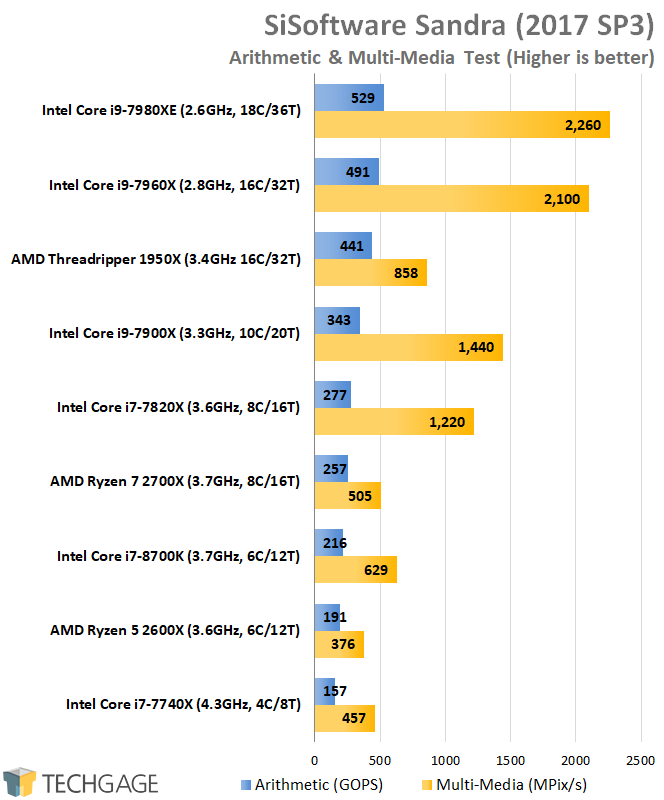
With this set of results, we’re seeing a continuation of the media dominance Intel started on the previous page. Sandra helps prove that Intel’s strengths there are undeniable, but for straight math, AMD’s extra muscle for the dollar can make all of the difference. Here, the 2600X falls far behind the 8700K in multi-media, but not so much in arithmetic. Meanwhile, the 8-cores of the 2700X help it edge a bit closer to the Coffee Lake chip.
Cryptography
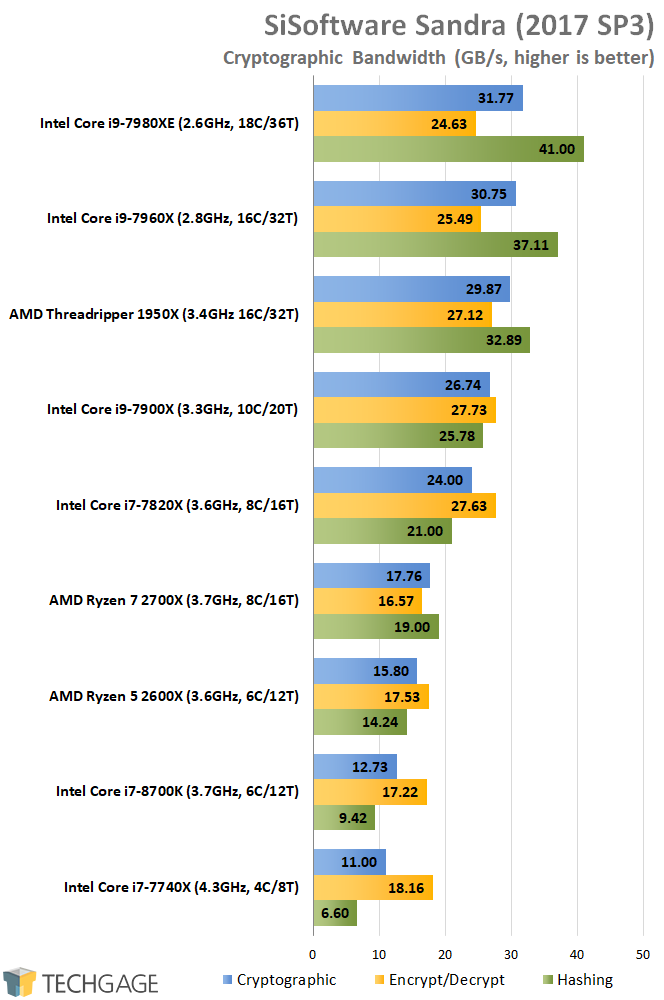
With both its Ryzen CPUs and Vega GPUs, AMD delivers some extremely good cryptographic performance. That’s easily seen here, with the 2700X yet again trouncing the 8700K. An even funner result is the 2600X, which also trounces the 8700K. This is a perfect example of where it pays to know your workload, and your hardware. This is a case where if crypto is largely your bag, it could make sense to go AMD. It’s no wonder so many sites recently talked about mining with Threadripper with this kind of strong hashing performance.
Financial & Scientific Analysis
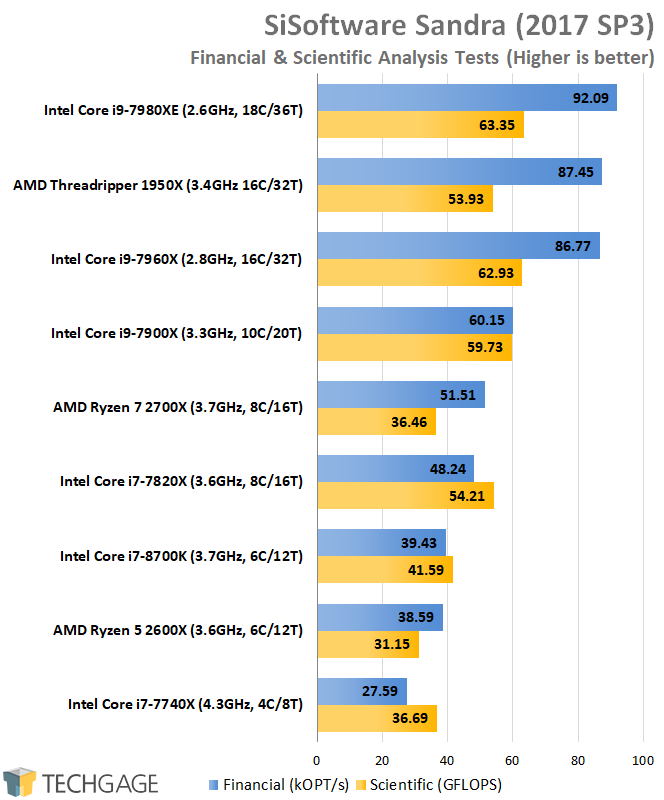
Like media, Intel has strong advantages in some scientific tests, such as this one. Even with its additional cores, the 2700X falls short of catching the 8700K, but again, the roles are reversed with the other test which relies more on additional cores than other general optimizations.
Memory & Core Bandwidth / Latencies
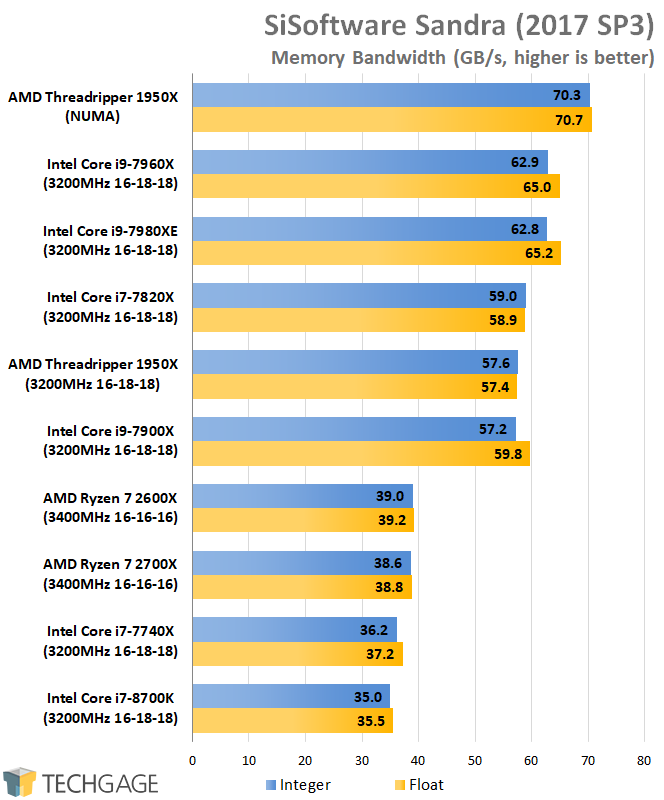
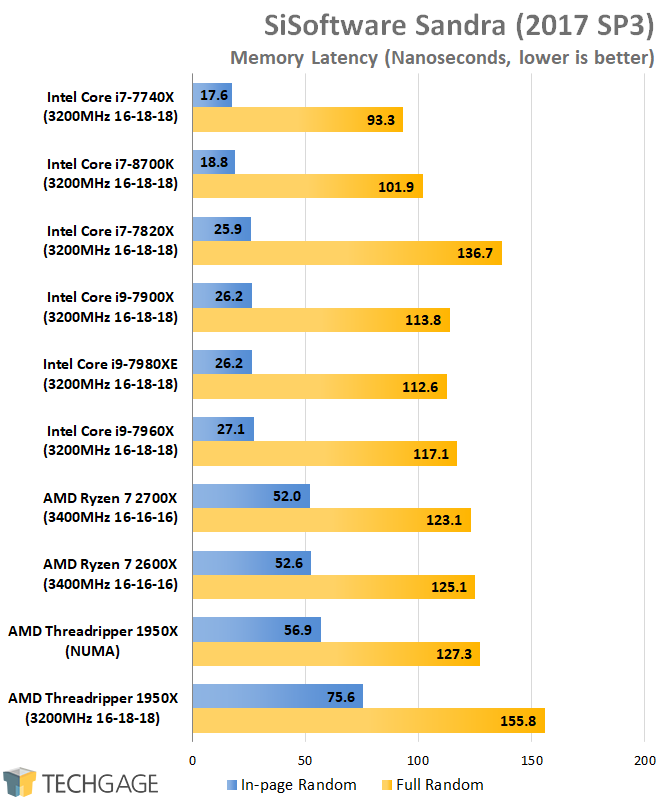
These results become our first “odd” ones, because despite using the same memory speed, the 2700X placed just behind the 2600X (across multiple tests that involved reinstalling each chip). As you’ll see on the Linux page later, the same kind of effect was seen even worse in the Stream memory benchmark. This isn’t an issue, per se, but it definitely stands out. There’s something about our configuration or the 2700X in particular that allows the 2600X to best its bandwidth.
As for memory latency, it’s pretty abysmal to look at on the AMD side here, but as most of the performance in this article can attest, those latencies don’t matter a great deal. If you are to measure the minutae of single-threaded operating system performance, you’re going to see a stronger result from Intel, but more often than not, Ryzen will help you get many substantial jobs done quicker, dollar for dollar.
Support our efforts! With ad revenue at an all-time low for written websites, we're relying more than ever on reader support to help us continue putting so much effort into this type of content. You can support us by becoming a Patron, or by using our Amazon shopping affiliate links listed through our articles. Thanks for your support!





